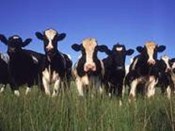Overcoming Hurdles to Eradicate Tuberculosis in Cattle
Although the prevalence of bovine Tuberculosis (TB) in the United States is low, the bacterial disease can still infect cattle, wildlife, and humans. Completely eradicating TB is not likely due to a certain bacterium that exists in wildlife and that can be transmitted to cattle. In addition, there is not an available test that can accurately detect all TB-positive cattle that are imported from Mexico. Scientists at ARS (Agriculture Research Service) are collaborating with international partners, the USDA’s Animal and Plant Health Inspection Service, industry and private companies to develop enw methods to prevent and control TB in cattle and wild white-tailed deer in the United States
Other countries with wildlife reservoirs of TB have been unable to eradicate the disease from cattle. Research to help control the disease targets wild boars in Spain, brushtail possums in New Zealand, and badgers in Ireland and the UK.
Strategies for both U.S. and international scientists include developing and improving TB tests and finding effective methods like vaccination to stop the spread of the disease.
Widespread pasteurization of milk, development of a diagnostic TB skin test for cattle, and establishment of an eradication program by the U.S. Department of Agriculture significantly helped decrease the incidence of bovine TB in humans in the United States.
Although the cattle skin test has helped efforts, it has drawbacks. It is not considered to be sensitive enough and requires a 72 hour waiting period for results. It is also difficult to test large herds and results are not always accurate. In addition, if the goal is to eliminate TB from a herd, the whole herd would have to be euthanized if just one tested positive. That could be economically devastating and problematic when the test isn’t completely accurate. So, researchers are trying to develop a better test that will help producers identify and remove infected animals and keep those that are disease free.
In addition to developing better tests for cattle, there is a need to control TB in wildlife. For more than 100 years, there has been a vaccine (BCG) that has proven to be safe and partially effective against TB in humans. The BCG vaccine was first tested in cows and showed protection against virulent M.bovis. Soon afterwards, it was used in humans and demonstrated protection against M.tuberculosis, the most common cause of BT in humans.
As a result, it seemed logical to try it with deer. So they tested it to see if it would protect them, what side effects would there be, and is it safe if those deer end up in the human food chain. The concern was if a human ate venison from a vaccinated deer, would they test positive for TB? Research was done and the found that BCG vaccine was never detected in common cuts of der meat, regardless of whether it was given orally or by subcutaneous vaccination in the safety experiments. It was never found in the muscle, but was found in lymph nodes and other tissues that aren’t commonly used for food by humans. So, it seems to be safe to use in deer.
Currently, they are testing oral forms of BCG to use as bate in order to deliver the vaccine to deer. They are experimenting with apple, acorn, and peanut butter flavors in hopes that one of these will be desirable to wild deer and provide them an effective vaccination delivery method.
This article was from the September 2013 Agriculture Research Service Magazine and was written by Sandra Avant, USDA ARS Information Staff.




